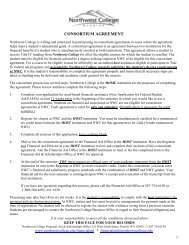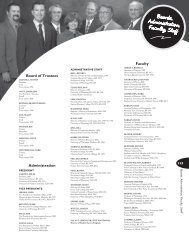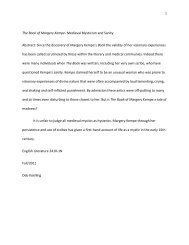Uncle Tom's Cabin
Uncle Tom's Cabin
Uncle Tom's Cabin
You also want an ePaper? Increase the reach of your titles
YUMPU automatically turns print PDFs into web optimized ePapers that Google loves.
10<br />
Through book sales alone, it is clear that <strong>Uncle</strong> Tom’s <strong>Cabin</strong> had drastic effects<br />
throughout America and the entire world. However, the reaction to the novel was even more<br />
apparent through the massive literary output that responded to <strong>Uncle</strong> Tom’s <strong>Cabin</strong>. Newspaper<br />
articles, letters, essays, poems, songs, plays, and merchandise burst from America in honor of—<br />
or in reaction to—Stowe’s novel. To demonstrate this, Stephen Hirsch cites poetical efforts in his<br />
article such as Francis E. Watkins’s “Eva’s Farewell” and “Eliza’s Flight,” as well as Mrs. R.S.<br />
Nichols’s “Gentle Eva.” Anti-Tom poems also exist, but they are few. These include William<br />
Grayson’s “The Hireling and the Slave” and a New York lady’s “The Patent Key to <strong>Uncle</strong> Tom’s<br />
<strong>Cabin</strong>” (Hirsch 308-309). However, many of the anti-Tom poems and other writings “reveal a<br />
hidden tone of fear and helplessness” (Hirsch 308). Perhaps this indicates that the authors<br />
themselves had reservations about the rightness of slavery and feared that they would be<br />
overcome by the abolitionist cause.<br />
Musical efforts also resulted from the publication and popularity of <strong>Uncle</strong> Tom’s <strong>Cabin</strong>.<br />
However, the songs often romanticized events or characters and sometimes completely bypassed<br />
actual events in the novel. For instance, Eva is a popular character in many such songs, but<br />
instead of portraying her as Stowe described her (a cheerful, Christ-like child), most songwriters<br />
choose instead to focus on Eva’s death and her sanctity. An example of this is in “<strong>Uncle</strong> Tom’s<br />
Lament for Eva,” where the author mourns,<br />
“For ‘twas in the night they laid you<br />
Dear Eva, in thy grave,<br />
E’en now my heart is breaking<br />
O, God, in pity save” (Hirsch 314).











